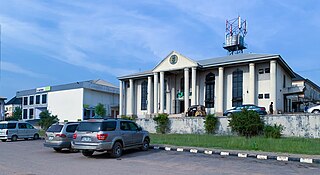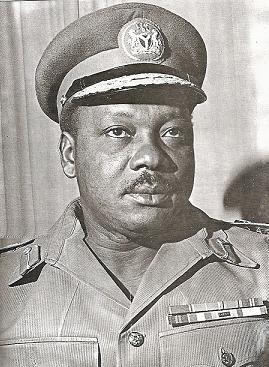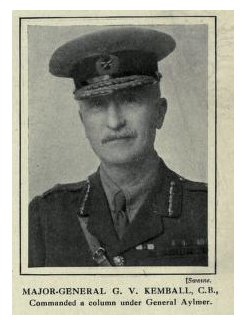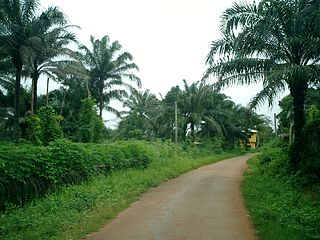Arrival and first expedition
In September 1903, following the Boer War, Major Trenchard was on leave in England and he considered his future options. He was undecided between staying in the Army or taking up gold prospecting in the Transvaal. After a chance meeting with Colonel Gilman, whom the War Office had appointed to recruit officers for the Southern Nigeria Regiment, he opted for remaining in the Army. After an interview in London with General Kemball, Trenchard was granted the position of Deputy Commandant of the Southern Nigeria Regiment with the promise that he was entitled to lead all regimental expeditions. [1]
Trenchard arrived in Nigeria in early December 1903, disembarking at the port of Bonny. He then travelled along the coast by steamer to Calabar, where he reported to the commanding officer, Colonel Montanaro. Montanaro was preparing an expedition to quell inter-tribal violence in the interior. On the day before the expedition was due to depart, Montanaro told Trenchard that he would not be accompanying him as he believed that Trenchard, being unacclimatized, would be a liability in the field. Despite Trenchard's protests, he remained behind. [2] By this time, General Kemball was in the Gold Coast and Trenchard was able to send a wire to Kemball threatening to return to Great Britain. Kemball contacted Sir Ralph Moore, the Governor of Southern Nigeria, who issued instructions for Trenchard to replace Montanaro as leader of the expedition. [3] Trenchard caught up with the expedition several days' march from Itu. After a brief exchange, Trenchard handed Montanaro the text of the governor's wire, which he accepted. After dealing with discontent from some of the regiment's officers, Trenchard led the expedition on towards the disturbed area. Several days later, Trenchard's expedition saw evidence of ritual killings and was then ambushed by Igbo men. After defeating the attackers, Trenchard's men occupied the local village overnight. The next morning the local tribal chief and his men handed in their arms. Trenchard then set about bringing those responsible for the ritual killings to justice and fighting bellicose Igbo men. In time, six more chiefs with a little under 10,000 men surrendered their arms to Trenchard's expedition of around 250 men, who had superior fire power. [4]
Revolt in German Cameroons and acting Commandant
In March 1904, Trenchard headed to the upper Cross River as the tribal revolt in neighbouring German Cameroons was spilling over into Nigerian territory. Trenchard put down the revolt in Aparabong and thousands of men surrendered firearms to his troops. [5]
It was also in 1904 that Trenchard was involved in bringing Igboland under British control. Initially many of the inhabitants refused to surrender weaponry to the British and Trenchard's political advisor, R M Heron, arranged for the destruction of the houses of those who harboured weapons. In light of this policy, many guns and other arms were surrendered to Trenchard's soldiers at Nkwo Nnewi where they were destroyed. During this time the Igbo nicknamed Trenchard Nwangwele, meaning young lizard in Igbo, on account of his figure. [6]
From summer 1904 to the late summer 1905, Trenchard was acting Commandant of the Southern Nigeria Regiment. During his time in command, Trenchard set about bringing firm discipline to what he considered an unruly unit. Gambling was banned, drunkenness and laziness were punished and action was taken against any soldiers caught with local women. [7]

Marshal of the Royal Air Force Hugh Montague Trenchard, 1st Viscount Trenchard, was a British officer who was instrumental in establishing the Royal Air Force. He has been described as the "Father of the Royal Air Force."

The Catholic Church in Nigeria is part of the worldwide Catholic Church, under the spiritual leadership of the Pope, the curia in Rome, and the Catholic Bishops' Conference of Nigeria (CBCN).

Onitsha is a city on the eastern bank of the Niger River, in Anambra State, Nigeria. A metropolitan city, Onitsha is known for its river port and as an economic hub for commerce, industry, and education. It is one of the largest metropolitan area in Nigeria with a fast growing population. It hosts the Onitsha Main Market, the largest market in Africa in terms of geographical size and volume of goods. Onitsha and neighboring Asaba on the western bank of the Niger River form a continuous metropolitan area.

Anambra State is a Nigerian state, located in the southeastern region of the country. The state was created on 27 August 1991. Anambra state is bounded by Delta State to the west, Imo State and Rivers State to the south, Enugu State to the east and Kogi State to the north. The State's Capital is Awka, while the State’s Largest City is Onitsha which is regarded as one of the largest metropolis area in Africa.

Johnson Thomas Umunnakwe Aguiyi-Ironsi was a Nigerian military officer who was the first military head of state of Nigeria. He seized power during the ensuing chaos after the 15 January 1966 military coup.

Nnewi is a commercial and industrial city in Anambra State, southeastern Nigeria. It is the second largest city in Anambra state after Onitsha. Nnewi as a metropolitan area has two local government area, which are Nnewi North and Nnewi South, all centred around the Nnewi town. Even Ekwusigo local government area is now part of Nnewi urban area, as urbanization continues to spread from Nnewi to neighbouring communities. The Nnewi town which is the only town in Nnewi North comprises four villages: Otolo, Uruagu, Umudim, and Nnewichi. Nnewi had been the centre of economics and commerce, being at a time the fastest growing industrial city east of the Niger, being the home of many industries such as The Ibeto Group, the Chicason Group, Cutix Cables, amongst others. The first indigenous car manufacturing plant in Nigeria is located in the city while the first wholly Made-in-Nigeria motorcycle, the 'NASENI M1' was manufactured in Nnewi.
The Aba Women's Riots of 1929 was a period of unrest in colonial Nigeria over November 1929. The protests broke out when thousands of Igbo women from the Bende District, Umuahia and other places in southeastern Nigeria traveled to the town of Oloko to protest against the Warrant Chiefs, whom they accused of restricting the role of women in the government. The protest encompassed women from six ethnic groups.

The Southern Nigeria Regiment was a British Colonial Auxiliary Forces regiment which operated in Nigeria in the early part of the 20th century.
The 1919 Southampton mutiny was a mutiny in the British Army which occurred in January 1919 in the aftermath of World War I. The soldiers, after being misinformed that they were being transported to Southampton to be demobilized, were then ordered to board troop ships for France. The mutiny was brought to an end without bloodshed when General Sir Hugh Trenchard threatened lethal force.
Eustace Broke Loraine was a pioneer British aviator and the first Royal Flying Corps officer to be killed in an aircraft crash.

Major-General Sir George Vere Kemball, KCMG, CB, DSO, R.A. (1859–1941) was a British Army officer of the 19th and early 20th century. He was a career officer in the British Army spending most of his career in India and Nigeria.
Igwe Kenneth Onyeneke Orizu III is the 20th Obi of Otolo and Igwe of Nnewi kingdom. He is the traditional supreme ruler and spiritual leader in Nnewi, an Igbo city in Nigeria. He is a member of the Nnofo Royal lineage and the successor to his father Igwe Josiah Orizu II, his grandfather Igwe Orizu I, and great-grandfather Igwe Iwuchukwu Ezeifekaibeya. Unlike most Igbo chiefs, there were heads of Nnewi before the arrival of Europeans. In Anambra State, Igwe Kenneth Orizu III is the vice chairman of the Anambra State House of Chiefs and as of 2015 one of the longest-serving tribal Kings in the world.

Joseph N. C. Egemonye was a Nigerian journalist, writer, politician and businessman. He was the Igbo editor of The Eastern Nigeria Observer from September 1960, under Joseph Akpan as editor. He later founded an Anglican Youth Fellowship magazine called The Voice of Youth. On the 5th of September 1974, he co-founded the Winston-Salem Chronicle, the oldest community newspaper in Winston-Salem, United States. In 1986, he became Editor-in-chief and founder of The Nigeria Monitor newspaper, the first weekly newspaper in Nnewi, southeastern Nigeria
Igwe Iwuchukwu Ezeifekaibeya (1855-1904) was the 17th Obi of Otolo and Igwe of Nnewi kingdom in the present day Anambra state of Nigeria. He is the traditional supreme ruler and spiritual leader in Nnewi, an Igbo city in Nigeria. He is a member of the Nnofo Royal lineage and the successor to his father Igwe Okafo. Unlike most Igbo monarchies, there were kings of Nnewi before the arrival of Europeans.
Igwe Orizu I was the 18th Obi of Otolo and the Igwe of Nnewi kingdom. He was the traditional supreme ruler and spiritual leader in Nnewi, an Igbo city in Eastern Nigeria. Eze Ugbonyamba was crowned the King of Nnewi and he took the ofo of Nnewi after his father's death in 1904. He was a member of the Nnofo Royal lineage and the successor to his father Igwe Iwuchukwu Ezeifekaibeya. Igwe Orizu I died in 1924 and was succeeded by his first son Igwe Josiah Orizu II. One of remarkable events of his reign was the arrival of the British in 1905.
Igwe Josiah Nnaji Orizu II (1902–1962) was the 19th Obi of Otolo and Igwe of Nnewi kingdom. He took the ofo of Nnewi in 1924 after his father's death. He is a member of the Nnofo Royal lineage and the successor to his father Igwe Orizu I , He was the first Igwe to officially become a Christian, although the traditional rulers of Nnewi are the ofo holders and as such, preservers and upholders of Nnewi culture and traditions.

Awka-Etiti, historically known as Awka-Diedo ; later mentioned as Awka-Nkakwu (Okankaku) by colonial authors, is an affluent town comprising seven villages in Idemili South local government area of Anambra state, Nigeria. The seven villages of Awka-Etiti in order of age established are: Nkolofia, Umunocha, Ejighinandu, Iruowelle, Umudunu, Nnaba and Ogunzele.
Joseph "Hannibal" Achuzia was a Nigerian British-trained aeronautical engineer who served as a major in the Biafran Army during the Nigerian Civil War.

The Ofala Festival is an annual ceremony practiced by Igbo people, particularly the indigenes of Onitsha, Umueri, Umuoji and other neighboring communities such as Aguleri, Nnewi and Ukpo in Dunukofia Local Government Area. It serves as a rites of renewal of the king or Igwe or Obi and it is similar to the Igue festival in Benin and the Ine, Osi or Ogbanigbe Festival in many mid-West Igbo communities of Nigeria. The term ofala, is derived from two Igbo words - ọfọ and ala. The festival is celebrated within two days mostly in October by the Obi and is a customary obligation that must be performed every couple of years without fail.










